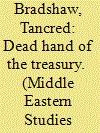| Srl | Item |
| 1 |
ID:
128225


|
|
|
|
|
| Publication |
2014.
|
| Summary/Abstract |
This paper addresses an aspect of British policy in the Trucial States that has received scant scholarly attention. It examines British attempts to promote economic and social development in the Trucial States, and places this policy within the context of British attitudes towards the economic development of the colonial empire. During the 1950s Britain's interest in the Arabian Peninsula expanded, in notable contrast with the rest of the Middle East. One aspect of this expanded role was British efforts to improve the economic and social conditions prior to the discovery of oil in Abu Dhabi in 1958. British officials on the ground were concerned to improve the lot of the population of these impoverished shaikhdoms for a combination of political and strategic and ethical reasons. This article shows that attempts to introduce a modicum of economic and social development in the Trucial States were hindered by the Treasury's refusal to provide adequate funds, and because of inherent problems in finding suitable development projects. Nonetheless, the plans put in place during the 1950s did provide the foundations for subsequent development programmes, which, in turn, drastically expanded as a result of oil wealth.
|
|
|
|
|
|
|
|
|
|
|
|
|
|
|
|
| 2 |
ID:
139255


|
|
|
|
|
| Summary/Abstract |
This article examines the process within which history was institutionalized in the Ottoman Empire. Institutional space for history had begun to be constructed within the context of interstate rivalry during the mid-nineteenth century. History had the task of “proving” the fact that the Turks had been from the very beginning a part of the “Western civilization.” The essential period for the institutionalization history was that of the regime of the Committee of Union and Progress in 1908–18, providing historians to emphasize the role of the “people” in history along with large structures of geography and “civilizations.” Once professional institutions were established and various history journals began to be published in this context, historians also began to pay due attention to the professional standards of the discipline. Despite the exclusionary tendencies of the Turkish official history, institutionalization during a revolutionary period functioned as a significant counter-tendency as institutions are path-dependent.
|
|
|
|
|
|
|
|
|
|
|
|
|
|
|
|
| 3 |
ID:
133300


|
|
|
|
|
| Publication |
2014.
|
| Summary/Abstract |
In the late 19th and early 20th century, tobacco exports from the Ottoman Empire rapidly increased. Thousands of workers began to earn their livelihoods in warehouses, sorting and baling tobacco leaves according to their qualities. Ottoman towns where tobacco warehouses were concentrated soon became the sites of frequent labor protests. This article analyzes strikes that broke out in two such towns, ?skeçe (Xanthi) and Kavala, in 1904 and 1905. It underlines the active role of the Ottoman government in the settlement of these strikes. It also shows that mobilized tobacco workers devised effective protest tactics and often secured a say in key decisions, such as when and under what conditions the warehouses operated. However, in both towns, labor activism was characterized by fragmentation as well as unity. The workers who took to the streets did not equally share the burdens and benefits of their collective actions. That inequality, the article argues, was rooted in gendered power relations, intercommunal rivalries, and other social tensions among the workers.
|
|
|
|
|
|
|
|
|
|
|
|
|
|
|
|